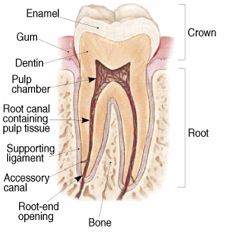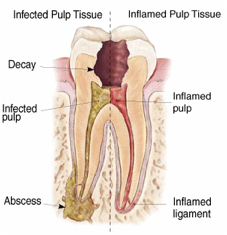|
What is root
canal treatment?
Root canal
treatment, also known as
endodontics, is the treatment of
problems with the pulp tissue
inside the tooth. When this tissue
or the tissue surrounding the
tooth root is diseased or damaged
due to decay, trauma, repeated
dental procedures, or a crack,
root canal treatment can save the
tooth and relieve the associated
pain.
| Healthy
Tooth |
Unhealthy
Tooth |
|

|

|
When performing a
root canal, Naomi removes the
inflamed or infected pulp,
carefully cleans and shapes the
inside of the canal, and fills and
seals the space.
After performing the
procedure, you return to your own
dentist to have a restoration
placed. Your dentist will advise
on the appropriate restorative
treatment. After restoration, the
tooth continues to function like
any other tooth.
What is an
Endodontist?
An Endodontist is a
dentist who has completed further
training in root canal procedures.
They perform routine as well as
difficult cases, including root
canal treatment and surgery.
Because they limit
their practices to treating root
canals, they treat these types of
problems every day which increases
your chances of saving your teeth.
They use their special training
and equipment to treat difficult
cases, such as teeth with narrow
or blocked canals, unusual anatomy
and diagnosing oral & facial
pain.
Why would I
need root canal treatment?
Root canal treatment
is required when the pulp, the
soft tissue inside the root canal,
becomes inflamed or infected. The
inflammation or infection can have
a variety of causes: deep decay,
repeated dental procedures on the
tooth, or a crack in the tooth. In
addition, an injury to a tooth may
cause pulp damage even if the
tooth has no visible cracks. If
pulp inflammation or infection is
left untreated, it can cause pain
or lead to an abscess.
What are the
symptoms of needing root canal
treatment?
Symptoms include
pain, prolonged sensitivity to
heat or cold, tenderness to touch
and chewing, discoloration of the
tooth, swelling, or draining pus
on the gum or face. Sometimes,
there may be no symptoms.
What if I
just take antibiotics?
Root canal infection
occurs within the tooth and
therefore does not heal with oral
antibiotics. Antibiotics may ease
the symptoms for a period of time
however the underlying infection
will still persist unless treated
with root canal treatment or
extraction. Antibiotics work
systemically (throughout the body)
and as root canal infection is
localized within the hard tissues
of the tooth the infection is not
affected by antibiotics. Naomi
only prescribes antibiotics if a
patient is pyrexic (has a high
temperature) as a result of the
infection. Normally antibiotics
are not prescribed regardless of
how infected the tooth is as the
root canal treatment itself treats
the infection. If a patient is on
antibiotics when they present for
treatment they will normally be
asked to stop taking them if
treatment is feasible.
What are the
chances of success?
Success rates for
endodontists are high at 90 to
95%. The more established an
infection is, the hardier the
infection and the more resistant
the infection is to treatment;
however success rates can still
reach 90% in established cases.
Retreatment success
rates are lower but are typically
between 70-80%. The reason for the
initial root treatment not working
affects the prognosis of the
retreatment. If the treatment aims
are not achieved then the
prognosis would be lower. At the
initial consultation it would be
discussed with you the likelihood
or otherwise of whether or not the
treatment aims can be achieved.
What are the
alternatives to root canal
treatment?
Though root canal
treatment is intended to help save
your tooth, this is not always
possible. Often, the only
alternative to endodontic
treatment is extraction of the
tooth. We advise patients to
discuss the restorative options
with their dentist should they
require an extraction.
Will I feel
anything during the procedure?
The tooth is numbed
using a local anaesthetic and in
the vast majority of cases there
is no discomfort. If a tooth has a
well established infection there
is no risk of feeling anything
during the treatment. There are
times when there may be some
discomfort but we know before we
start the treatment if this is
likely or not and in these cases
we take extra measures to try to
minimize any possible discomfort.
Should I
expect any problems between
appointments?
You can expect there
to be some tenderness for a few
days but there is often no
tenderness at all. If you take the
recommended anti-inflammatories
then this usually prevents
problems. In very rare instances
patients may have a flare-up. A
flare-up is an acute inflammatory
response. Even with every effort
they will occasionally occur. You
will have Naomiís mobile number
and she is happy for patients to
contact her between appointments
with any queries or problems.
Naomi will always see a patient
for the treatment of a flare-up
and treatment normally involves
redressing the tooth and
medication.
Do I need to
do anything before or after the
appointments?
You should eat as
normal before your appointments.
Naomi normally recommends
anti-inflammatories for a few days
after each appointment and you
will be advised at the treatment
appointment. After your final
appointment, you need to return to
your own dentist to place a
permanent restoration in the
tooth. This is important as it can
affect the success of the root
canal treatment.
How do I
book an appointment?
Most of our patients
are referred by their dentists but
patients can contact the practice
directly. We can book a
consultation with treatment time
allowed but if there are any
queries about the diagnosis or
whether root canal treatment is
feasible then occasionally we
prefer to book consultations
separately to treatment
appointments. Please see our
contact details below.
Images reproduced
with permission from the American
Association of Endodontists.
|